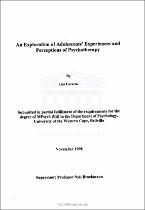| dc.contributor.advisor | Broekmann, Neil | |
| dc.contributor.author | Lazarus, Lisa | |
| dc.date.accessioned | 2023-06-13T11:25:01Z | |
| dc.date.available | 2023-06-13T11:25:01Z | |
| dc.date.issued | 1998 | |
| dc.identifier.uri | http://hdl.handle.net/11394/10212 | |
| dc.description | Magister Psychologiae - MPsych | en_US |
| dc.description.abstract | Adolescent psychotherapy research is frequently empirically based. Little attempt is made to elicit this age group's subjective perceptions of their therapy experience despite the fact that adolescents experience multiple emotional problems and that psychotherapy is often the intervention of choice. This study sought to explore the therapy experiences of eight adolescents. Participants were asked about any changes that occurred as a result of therapy, the reasons of these changes of lack ofchanges, their perceptions of the psychotherapy relationship as well as their perceptions of other's attitudes towards their therapy. Reasons for initiation and terminating therapy were also discussed as the high adolescent psychotherapy drop-out rate is often noted in the literature. The overall research design was qualitative. Phenomenology and developmental theory informed the design and the interpretation of this study. The participants were asked about their experiences through the use of semi-structured interviews. The interviews were then transcribed and a thematic analysis was carried out. It emerged that some adolescents felt that behavioural and insight orientated changes had occurred. Although some participants preferred to see changes as selfmotivated rather than as a consequence of the therapy experience. This could be as a result of the adolescent's desire to separate or individuate from the therapist in the same manner that the adolescent wishes to separate from the parents. This adolescent challenge was again reflected in some adolescents' reasons for termination - certain participants wished to handle problems on their own. The therapeutic relationship was often compared with that of friendship although it was noted that therapy offered additional benefits such as the increased power of the therapist and the ability to share certain information with the therapist that couldn't be shared with friends. Adolescent peers were generally felt to be accepting of therapy, however therapy was often viewed as shameful and secret during the childhood years. The findings suggest that additional research is needed, particularly with adolescents receiving therapy from state services such as hospitals and school clinics. | en_US |
| dc.publisher | University of the Western Cape | en_US |
| dc.subject | Adolescents | en_US |
| dc.subject | Psychotherapy | en_US |
| dc.subject | Therapy | en_US |
| dc.subject | Participants | en_US |
| dc.subject | Relationship | en_US |
| dc.title | An exploration of adolescents experiences and perceptions of psychotherapy | en_US |
| dc.rights.holder | University of the Western Cape | en_US |

